"The Evidence" is a new television drama trying to be too many things at the same time. It has all the colors and poppy editing of "CSI", it has the gritty cop-and-partner edge of "Law & Order", and just about every other trope of your typical episodic criminal justice procedural you can find. Because all these things are so easily identifiable, and because of unchallenging writing, "The Evidence" is trying too hard, and at the end of the day it just isn't a good TV show. This is not it's highest crime, though. The show takes place and is shot (to some extent) in San Francisco. The only reason for this (evident after these first two episodes, after which I will not continue) is because of its scenery, its diversity, and all the other things that makes San Francisco seem like a good place for a show to take place in. It's all-too-clear that the city is being used and not utilized.
A show like "Grey's Anatomy" for instance, uses Seattle delicately; it acts as an interchangeable city. The show could take place anywhere else in the country, and the scripts respect this.... they're not going out on the streets or laboring past landmarks in every episode because it isn't necessary to do so. However, Seattle provides a comfortable backdrop, and in some respects pays respect to that city as a pleasant place for the story.... and that's where it ends. Another somewhat recent medical drama, "Presidio Med", albeit short-lived, treated San Francisco similarly as "Grey's Anatomy" treats Seattle; if they can't use the city as a focus, they use it only as establishing-shot setting.
I absolutely do not object to the film/television industry choosing to shoot in San Francisco, particularly because it brings revenue to the city and thereby helps the toruism industry. In fact, San Francisco has seen a decline recently in film industry interest.... I'm not so sure "Nash Bridges" counts. What I do object to is using the city (er, The City) as a dumping ground for a crappy unremarkable procedural show like "The Evidence" in the guise of paying respect to it. This show is trying so so hard to screech past every San Francisco landmark (including CGI-ing shots of the Bay Bridge flying over, in the wrong direction no less, supposed-waterfront locales that the Bay Bridge happens to be nowhere near), it cheapens the effect. Characters say useless throw-away lines such as "...from here to the Farallones" and mention the Glen Park precinct of SFPD.... they even created a ficitonal San Francisco Gazette for a crossword puzzle as evidence, feh. When we first meet the two leads in the pilot, they are playing golf on some fictional garbage scow/wharf with the Golden Gate Bridge sailing behind them, kicking smashed aluminum cans and walking past dirty chain link fences and panhandlers. In reality, where they chose to film (Crissy Field), garbage and metal fences are nowhere to be found.... instead there are beautiful sand dunes and grassy lawns, usually with joggers and stroller-pushing moms enjoying their afternoon by the bay. In their disgusting attempt to make San Francisco seem gritty while getting that landmark money shot in the background, they wanted to up the grunge factor. Why not shoot in Hunter's Point, then.... or the Tenderloin? I have a feeling that the producers are averse to having their actors witness homeless transsexuals peeing on street corners. Now that would be gritty television.
What's the point of the show? It's not about San Francisco, it's about "the evidence" of crimes in San Francisco that could just as easily be found anywhere else in the world.... why not set this show in Houston, St. Louis, Atlanta? The producers sat around some mahogany table and decided to choose somewhere sexy, and somewhere that stands out.... and because New York is overused, they threw the dart at San Francisco.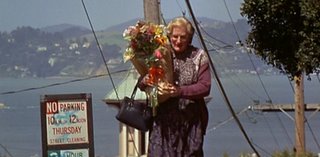 I'm no expert on the history of San Francisco in the movies and TV.... but others have come and succeeded, using San Francisco as the right kind of backdrop. Mrs. Doubtfire (1993), for instance, is almost a love letter to San Francisco, taking advantage of its ups and downs and letting the scenery shots come naturally and not be overused. This may be because both the director (Chris Columbus) and the star (Robin Williams.... why wasn't he Oscar nominated?) are San Franciscans. They filmed the movie with love for the city in mind, not as some any-city with sexy scenery.
I'm no expert on the history of San Francisco in the movies and TV.... but others have come and succeeded, using San Francisco as the right kind of backdrop. Mrs. Doubtfire (1993), for instance, is almost a love letter to San Francisco, taking advantage of its ups and downs and letting the scenery shots come naturally and not be overused. This may be because both the director (Chris Columbus) and the star (Robin Williams.... why wasn't he Oscar nominated?) are San Franciscans. They filmed the movie with love for the city in mind, not as some any-city with sexy scenery.
Maybe I've contradicted myself above, or made the argument a little muddled. I have a high standard for San Francisco (could you tell?), and it's disappointing when Hollywood misses the bar. This is my own thing, though.... clearly I'm sensitive, but only because I love The City so much.
Wednesday, March 29, 2006
tread lightly, film industry, when bringing your junk to San Francisco
pondered by
is that so wrong?
at
10:23 PM
3
comments
![]()
Tuesday, March 28, 2006
say good-bye to these
Today (yesterday?) was a a sad day for those who love quality television.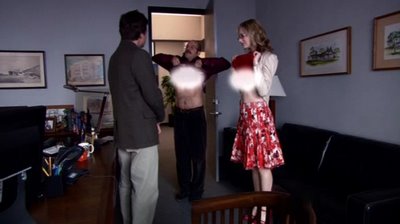
Rest in peace, "Arrested Development".... The three seasons we had were just not enough. There were so many more places to go. Here's to hoping that joke about making it a movie in the series finale was not actually a joke.
And now a question: If a show is so beloved by fans, why decide to end it when there are other options to keep it on the air (re: Showtime) on the table? Can't one argue that keeping a show on the air for the sake of the fans (and there are many of us indeed) is worth keeping it on the air?
pondered by
is that so wrong?
at
8:09 PM
1 comments
![]()
Tuesday, March 21, 2006
24: another one bites the dust
Never has there been as trigger-happy a show as "24". This season, the writers decided to pull out all the stops and start slaying main characters left and right. My guess is that this was in an attempt to be shocking and unforgiving, a trait the show is known for. I'm disappointed though: the show wears it's badge of "unpredictability" with pride, hence the unpredictable has become predictable.
Last week marked the demise of one of the remaining characters that has been around since Season 1, stabbed in the chest with a syringe full of painful death serum. The week before that they killed off the big-lug cranky-yet-lovable analyst by having him miss the chance to get safely away from a room filling with nerve gas. It seems that in each season a main character gets wiped off the opening credits because their character has met with death.
When a main character is killed off, it (should) signify a major turning point, a place from which the story cannot return, thus forcing the course of the story to proceed in a new and uncharted direction. I think this goes for any kind of long-form storytelling, not just television series, but novels too. I think killing off important characters is a powerful, challenging, and potentially daring move to make in the course of a series.... but "24" has cheapened the effect dramatically, and I feel that the writers have abused a complicated trick. "24" moves at such a fast clip (each season getting faster and faster, hence upping the suspension of disbelief required to stay tuned) that there seems to be no time for the deaths of main characters to affect the story. They are seen as casualties only, victims of the Threat At Hand and swept aside with sheets over their cooling corpses. It seems that the Threat At Hand is unstoppable until it is inevitably stopped in the last episode of the season (duh), and everything that got in its way is left forgotten.
I think that killing off a main character can be an incredibly useful device, particularly in the way of shock value. I think "24" blew its shock value wad back at the end of the first season when Jack Bauer's wife unexpectedly bit the dust (let's not even consider this a spoiler anymore: to the rest of you, rent yourself the series and start watching). That death was a great point to launch from into the second season, thus changing the relationships of the characters and altering how the story was told. Shock value is a really important trick too, especially in the way of waking up the viewer.... unfortunately, it's the kind of trick that shouldn't be overused. With Jack's wife meeting her maker so unexpectedly, "24" picked up a reputation that "nobody is safe".... which worked for awhile. Now that we're in the trenches of Season 5 and three fairly important characters to the series (not necessarily to this season) have been killed off in the last three episodes. That "nobody is safe" mentality has lost its edge which in turn takes away from ther whole point of the surprise.
For really good TV, and I mean quality writing, it's important to challenge both the story and the viewers. The big death at the end of Season 1 did just that: challenged. In Season 3, two of "24"'s characters (in my opinion, the most interesting characters they've ever had) also met their end by death. I suppose that their deaths were unpredictable to some degree, but not challenging to the story. I can understand needing to write them out for awhile, but killing them off prevented the viewer from filling in some blanks that had been left open. With the recent deaths too (including those main characters that were axed in Season 4), I've been reading that the writers of "24" have said that the reason why these characters have been killed off was because they've reached the end of what they can provide the story. Why is it necessary to kill them all off, then? A more challenging route would to be find a plausible (and equally as shocking) reason to write them out of the story without putting such a final end to them. Besides, this always leaves the door open to bring them back and surprise the viewer in a completely fun and different way.... particularly if they bothered to even leave a complex villain alive long enough, this could be used (and they did, in Season 3) to great effect.
"24" must pride itself for being a bloodbath, I guess. As I said above, the killing off of a main character is a trick that should be used sparingly and necessary only when the story must change because of it. Season 5 opened with two well known characters shot by sniper (1) and then killed in a car bomb (2), but only one of those killings was necessary to launch the action of Season 5, and the poor character who met their end under a burning car was an unnecessray casualty. Not one death of the handful of main characters from "24"'s roster since that of Jack's wife from Season 1 (and the death by sniper bullet at the beginning of this season) has served a story-altering principle. They seem to be scuttled out of the way as an all-too-convenient way for the writers to move on; this wouldn't be such a big deal if it weren't such a disappointing pattern. A main character should not be killed off for the sake of shock value (like the two most recent from this season); it should challenge the story to evolve and not to wash the hands of writers who ran out of creative capital for them.
I think, in the end, "24" is changing. I'd be more angry about this if it didn't seem evident that this is the intent of the writers, so therefore I must let it be. A lot of the repetition and impulsiveness that the show has started to rely upon is it's own formula, the formula it's adapted for itself and has grown comfortable with now five seasons in. What started off as a solid serial television show is starting to break into a hybrid form of episodic seriality.... meaning each season is kind of episodic, rather than each episode. Episodic television delivers stories from beginning to end within an episode, and this trend is not broken as the series continues.... viewers tune in because they like having the sense of stability that each episode provides them, that nothing will irreversibly change or characters will not act out of their roles. It seems that "24" has taken this model up a notch to the season-long level; I guess viewers are most interested in the show because they like having the stability on the season-long level.... we can expect the same things to happen each season because that is the episodic quality the show has taken on. These writers have axed some of the best characters (and actors) that they've created for the show; I guess this suggests that they want a revolving door of continuous characters.... this only furthers the concept of the season-as-episode. I certainly tire of the all torture-pornography, all the slippery bad guys with an entire alphabet worth of masterminded backup plans, all the times Jack Bauer comes this-close to getting the information he needs before his informant gets killed. It seems though that this is what the viewing public likes and wants, and hence "24"'s ratings are steadily rising. And I keep watching.
pondered by
is that so wrong?
at
8:12 PM
1 comments
![]()
Monday, March 20, 2006
collision of two worlds from the television pantheon
You know that feeling when you're watching a movie or a TV show, and suddenly you recognize an actor from another beloved show or movie? That's kinda cool, right? Unfortunately, I tend to be a junkie for such things, sometimes turning into a strange human-imdb.com hybrid sitting next to whatever friend happens to whisper "where have I seen him/her before?" in a movie or while watching TV.
It's even more exciting when a character pops up in a current beloved TV show from another beloved TV show of the past, thus creating a golden moment for the geeky viewer (me). For the actor, it's just another job. For me, it's a collision of two worlds, damn it.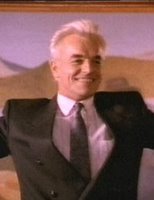 Anybody notice who Vice President Hal Gardener is this season on "24"? The actor is Ray Wise, and, that's right.... he's Laura Palmer's dad Leland from "Twin Peaks" (!!!). This isn't exactly new news (his first appearance on "24" was two weeks ago; read the link only if you happen to know "Twin Peaks", because it's too spoiler-y, even if the show's been off the air for 15 years). This guy's performance on "Twin Peaks" was indelible enough (i.e. moving/disturbing enough) in my childhood, having watched the show in awe and fascination and near-terror, that I pick him out in other things he's popped up in.... yes, including an episode of "Star Trek: Voyager" from seven or eight years ago, under strange head makeup. He also had a plum role (and if it were in other years, maybe even oscar-attention-grabbing) as a tortured news anchor in Good Night, and Good Luck (2005). Not that he's taking the Hollywood circuit by storm or anything, but because he had quite a pivotal role on one of the most important television shows ever made, he certainly has a secure place in television history (no matter what kind of geeky history I've conjured up that might be).
Anybody notice who Vice President Hal Gardener is this season on "24"? The actor is Ray Wise, and, that's right.... he's Laura Palmer's dad Leland from "Twin Peaks" (!!!). This isn't exactly new news (his first appearance on "24" was two weeks ago; read the link only if you happen to know "Twin Peaks", because it's too spoiler-y, even if the show's been off the air for 15 years). This guy's performance on "Twin Peaks" was indelible enough (i.e. moving/disturbing enough) in my childhood, having watched the show in awe and fascination and near-terror, that I pick him out in other things he's popped up in.... yes, including an episode of "Star Trek: Voyager" from seven or eight years ago, under strange head makeup. He also had a plum role (and if it were in other years, maybe even oscar-attention-grabbing) as a tortured news anchor in Good Night, and Good Luck (2005). Not that he's taking the Hollywood circuit by storm or anything, but because he had quite a pivotal role on one of the most important television shows ever made, he certainly has a secure place in television history (no matter what kind of geeky history I've conjured up that might be).
I tend to identify "Twin Peaks" alumni in whatever TV/movie media I happen to notice (it's a sickness).... Most recently: Piper Laurie ("I can see your dirty pillows!") played some old chick last year on another indescernible episode of "Cold Case"; as another vice president, Windom Earle channeled Dick Cheney in The Day After Tomorrow (2004); Lara Flynn Boyle got blown off the roof of a casino on "Las Vegas"; Heather Graham got a swift kick in the ass when her "Emily's Reasons [whatever]" sitcom tanked; even Agent Cooper has a lead role (and a lot of hair) on ABC's "In Justice", currently serving in a Friday night wasteland timeslot.
pondered by
is that so wrong?
at
2:59 PM
2
comments
![]()
Monday, March 13, 2006
Nabokov for beginners like me
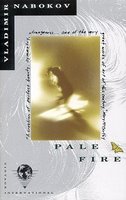 My first foray into the fiction of Vladimir Nabokov comes with Pale Fire. I've heard a lot about this guy. Both Lolita and Pale Fire have found their way onto quite a few lists of the best that English literature has to offer. I've heard about his style, his effortless command of language, his dizzying control of word-play, his mastermind use of vocabulary. I've heard nothing but good things about his writing. One thing I didn't count on, though, was his capacity to shit on his reader.
My first foray into the fiction of Vladimir Nabokov comes with Pale Fire. I've heard a lot about this guy. Both Lolita and Pale Fire have found their way onto quite a few lists of the best that English literature has to offer. I've heard about his style, his effortless command of language, his dizzying control of word-play, his mastermind use of vocabulary. I've heard nothing but good things about his writing. One thing I didn't count on, though, was his capacity to shit on his reader.
Pale Fire, to some, is a joyous romp, a delirious inside joke that is just so clever, how could one not be enthralled by it? It's basically a first-person commentary on a 999-line poem written by a fictional poet just before his untimely death. The narrator is obssessed with the life of this poet, and his massive commentary on the poem digresses back and forth between the narrator's fantasy (or is it?) world and his ultimate jealousy of the success of his poet friend. It's clear that Nabokov had something big in mind for this book, and the construction is so intricate, it's clear the guy definitely has the chops to be as praised as he is. The writing, for the most part, is lyrical and beautifully honed. The problem: the narrative is so aggressive, so clear that it's playing around with something (and what feels mostly like the reader), that I'm left in the cold. It's certain that some (most?) readers will be left in the dark, and I'd have a little less of a negative aftertaste if I didn't feel that the author was laughing at those who don't catch on. There are just too many subtle in-roads to get to the big inside joke.... they are there, but how much work am I expected to do? The layers are so deep that I don't even know where to begin.
This brings up an interesting question about storytelling in general. How much do you want your audience to work for the payoff? At what point do you alienate them, having made them work too hard? At what level can a story withhold information to tantalize yet entice the audience to remain invested? How does the audience know when the author/auteur is wanting them to solve the puzzle, and how do they know when the author/auteur turns their nose up at them?
It's interesting that my opinion of aggressive storytelling takes a different stance when it comes to movies. I tend to like the movies that take the non-traditional approach (three-act struture be damned!) to storytelling. I like picking apart the story to find how all the pieces connect, I like being able to do some of the leg work on my own. As far as successful examples of aggressive narrators in film, one can look to those written by Charlie Kaufman, the soon-to-be-annointed patron saint of screenwriting. I love the feeling of hard-fought realization when I solve the puzzle box of the story.... so when do I reach the point that I feel I've been messed with rather than encouraged?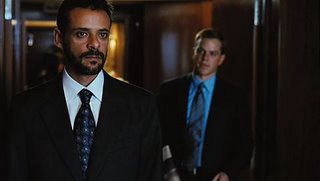 A recent example: Syriana (2005) uses an aggressive narrative, but only in how the story is delivered.... each scene is presented quite traditionally, actually, but how the scenes and storylines connect creates a massive webwork that definitely falls on the non-traditional side of storytelling. The trick is that you have to let the film wash over you as it unfolds; it's not designed to be picked apart scene by scene, but rather designed to complete a picture of the whole when it is all said and done. I think that this strategy worked very well for the film, particularly in the face of its scatterplotted story; it was the only way the story could be told. This isn't exactly the best example of a puzzle box movie, but it has similar facets.
A recent example: Syriana (2005) uses an aggressive narrative, but only in how the story is delivered.... each scene is presented quite traditionally, actually, but how the scenes and storylines connect creates a massive webwork that definitely falls on the non-traditional side of storytelling. The trick is that you have to let the film wash over you as it unfolds; it's not designed to be picked apart scene by scene, but rather designed to complete a picture of the whole when it is all said and done. I think that this strategy worked very well for the film, particularly in the face of its scatterplotted story; it was the only way the story could be told. This isn't exactly the best example of a puzzle box movie, but it has similar facets.
Pale Fire is much the same way, though.... while I was reading it, I was hoping for the wash-over effect to lead to the lightbulb going off in my head. Instead, I was left at a pitiful stage of brownout. My reading of it wasn't unenjoyable, exactly, but in the end there were just too many subtleties for me to try (and ultimately to want) to hone in on. I'm afraid that I fall in the camp of those who are not in love with Nabokov's writing, but maybe I should pick the book back up in a year and give it another go now that I know what it's trying to do. Maybe his other beloved works like Lolita and Pnin will prove me wrong?
pondered by
is that so wrong?
at
6:24 PM
3
comments
![]()
Monday, March 06, 2006
a Crash course on bloated oscar hype
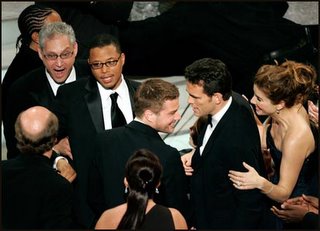 So, am I the only one in the world who didn't think Crash was that surprising a win for this year's Best Picture Oscar? Sure it came out quite early in the year, but it certainly wasn't dead on arrival come Oscar night, like many nominees stretched across the categories. Everyone was still talking about it.... it did, after all, make it on quite a few lists of the best films of 2005.
So, am I the only one in the world who didn't think Crash was that surprising a win for this year's Best Picture Oscar? Sure it came out quite early in the year, but it certainly wasn't dead on arrival come Oscar night, like many nominees stretched across the categories. Everyone was still talking about it.... it did, after all, make it on quite a few lists of the best films of 2005.
The media is having a field day calling Crash a surprise win. They're probably aching to call something a surprise because all the other high profile catgeory winners were unabashedly not surprising. Crash was just as polarizing (some people really loved it, others really hated it) and just as "controversial" (ugh) as the expected frontrunner, Brokeback Mountain (but hey, Ang Lee won Best Director, and that idiotic guitar score sailed its was to winning Best Original Score). They're both good dramas, but for very different reasons: they're telling different kinds of stories, they're trying to do different things. That said, I will argue that a movie like Crash is a more difficult feat to pull off, given its labyrinthine interconnections and mammoth cast.
There have been bigger upsets in the past (like Shakespeare in Love taking out Saving Private Ryan in the parking lot for the Best Picture Oscar of 1998), so to make this one look like a shocking event is just too self-indulgent. Thank god this awards season of just-okay movies is finally over.
UPDATE (03/07/2006): Roger Ebert zeroes in on this issue too, and doesn't disappoint.
pondered by
is that so wrong?
at
1:35 PM
1 comments
![]()
Friday, March 03, 2006
oscar retribution for all the wrong reasons
As far as film acting goes, I think it might be too much to ask that the Academy Awards actually award the best performances of the year. It's hard enough justifying the quality of all five nominees in comparison with those one or two who were snubbed. The sad reality is that the awards circuit is blighted with campaigns and advertising, thus obscuring great performances in favor of popular performances. The Oscars have certainly gotten better at this in recent years, but still nominees pop up and they stink of for-your-consideration campaign afterbirth.
I too get caught up in the awards-season furor, partially because I'm a movie junkie and because I just can't deny the starstruck appeal of the whole thing. I don't think that there is any real way to quantify what makes the best five performances of the year, and then from that selecting the best performance of the year. This doesn't stop me from getting fired up when a very deserving actor gets snubbed of a nomination in favor of a dismal or overhyped performance by another; same goes for an actor winning the award in favor of the truly deserving.
This year has been relatively lackluster as far the awards circuit, for two reasons, simple and complicated. 1) simple: competition has been light because the films this year have been slightly underwhelming. 2) complicated: the disturbing mass exodus of countless awards shows bestowing the same categorical awards on the same people. It seems with each new year comes a new awards show designed to further litter the mantles of it-actors, so it's no wonder that the Oscar goes to the same actor that's picked up fifteen other awards for the same performance. Last year's Academy Awards were no surprise: all four acting prizes went to the four expected actors. The last three or four years have been relatively the same. This year is shaping up to be even more unsurprising. What's the point of watching an awards ceremony with the grandiose "and the winner is" envelope-opening when you already know who is going to win? The Oscars have lost their punch. I haven't been amazed by any of the films I saw this year. I' did see a lot of good films, many of which were nominated for Oscars, but none of them were show-stopping for me. Apparently I was only one of ten people who saw Stay (2005), which I thought was beautifully filmed and was quite intriguing and artful (and worthy of some Best Editing awards attention).... and apparently I was one of six who probably thought of it that way.
I haven't been amazed by any of the films I saw this year. I' did see a lot of good films, many of which were nominated for Oscars, but none of them were show-stopping for me. Apparently I was only one of ten people who saw Stay (2005), which I thought was beautifully filmed and was quite intriguing and artful (and worthy of some Best Editing awards attention).... and apparently I was one of six who probably thought of it that way. 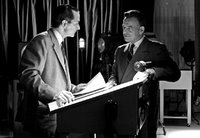 Out of the five Best Picture nominees for 2005, the one I enjoyed most was probably Good Night, and Good Luck, mostly because it had all the right pieces of a quality film (solid screenplay, strong performances, beautiful direction, art direction, cinematography, etc), and it gained my complete trust. The other four are all good movies (and I would recommend them), but they definitely creak under their own weight.... in some ways, they're too big for their own good, and not as tight and complete as they could have been. The fact that this year's films have been so underwhelming is probably why a movie like Brokeback Mountain is masquerading like it's an unsurpassable achievement in filmmaking, which it isn't. Brokeback Mountain is flashy only because of its subject matter, thus camouflaging notable strikes against it; the screenplay oozing with sentimentality, for instance. Ultimately, it feels like the kind of movie that was made to win awards.... and folks, this isn't why movies should be made. But, because of it's unstoppable amount of press, it will walk away with the Best Picture trophy on Sunday night.
Out of the five Best Picture nominees for 2005, the one I enjoyed most was probably Good Night, and Good Luck, mostly because it had all the right pieces of a quality film (solid screenplay, strong performances, beautiful direction, art direction, cinematography, etc), and it gained my complete trust. The other four are all good movies (and I would recommend them), but they definitely creak under their own weight.... in some ways, they're too big for their own good, and not as tight and complete as they could have been. The fact that this year's films have been so underwhelming is probably why a movie like Brokeback Mountain is masquerading like it's an unsurpassable achievement in filmmaking, which it isn't. Brokeback Mountain is flashy only because of its subject matter, thus camouflaging notable strikes against it; the screenplay oozing with sentimentality, for instance. Ultimately, it feels like the kind of movie that was made to win awards.... and folks, this isn't why movies should be made. But, because of it's unstoppable amount of press, it will walk away with the Best Picture trophy on Sunday night.
As far as winning Oscars seem to go, the Academy tends to like to make up for its mistakes. This furthers the culture of not awarding the best performance of the year, but rather making up for the lack of an award or nomination in a previous year. Usually in cases like this, they honor the lesser performance with a nomination or an award because the more deserving performance was overlooked. Case in point:
* Russell Crowe, nominated for Best Actor for The Insider (1999), picks up a pity win for the far less-superior (and downright overhyped) Gladiator (2000).
* Nicole Kidman, nominated for Best Actress for Moulin Rouge (2001) lost to Halle Berry (why?!).... so they made up for it by awarding her for The Hours (2002). This had an unfortunate domino effect, though: Kidman's performance was great (category fraud alert: it's probably closer to a supporting role), but all the attention of that damn prosthetic nose eeked out Meryl Streep of a rightful nomination for the same movie, and robbed the actual Oscar out of the hands Diane Lane for Unfaithful (2002) or perennial "I can't believe she didn't win!" favorite Julianne Moore in Far From Heaven (2002).
* Paul Giamatti, mysteriously not nominated due to gross oversight as Best Actor for Sideways (2004), picks up his requisite pity nomination as Best Supporting Actor in the throwaway Ron-Howard-awards-baiter Cinderella Man (2005). * Naomi Watts (those of you who know me already know where this is going) picked up a Best Actress nomination for 21 Grams (2003) because the Academy realized too late that they overlooked perhaps one of the greatest performances of hers, let alone of film history, in Mulholland Drive (2001).
* Naomi Watts (those of you who know me already know where this is going) picked up a Best Actress nomination for 21 Grams (2003) because the Academy realized too late that they overlooked perhaps one of the greatest performances of hers, let alone of film history, in Mulholland Drive (2001).
And then, sometimes popularity and hype of an actor or performance is so strong that there's no stopping the award from coming.... they just steamroll their way to the podium on recognition alone. See Jamie Foxx's continuously-replicating and thereby nauseating acceptance speech as Best Actor for Ray (2004).  See Julia Roberts winning Best Actress for Erin Brockovich (2000) (a performance that I liked and was certainly deserving of the nomination, but ROBBED Ellen Burstyn of her rightful Oscar for Requiem for a Dream (2000)). And, see this year, when Reese Witherspoon will pick up her Best Actress Oscar for Walk the Line on charm alone.
See Julia Roberts winning Best Actress for Erin Brockovich (2000) (a performance that I liked and was certainly deserving of the nomination, but ROBBED Ellen Burstyn of her rightful Oscar for Requiem for a Dream (2000)). And, see this year, when Reese Witherspoon will pick up her Best Actress Oscar for Walk the Line on charm alone.
There are so many others. Can you name a few?
In the end though, like so many things, I gripe because I like it all too much. Past indiginities will not stop be from holing up in my apartment with frito pie and seven layer dip and a bottle of wine to watch the Oscars on Sunday night. Anybody wanna join me?
pondered by
is that so wrong?
at
1:38 PM
2
comments
![]()

